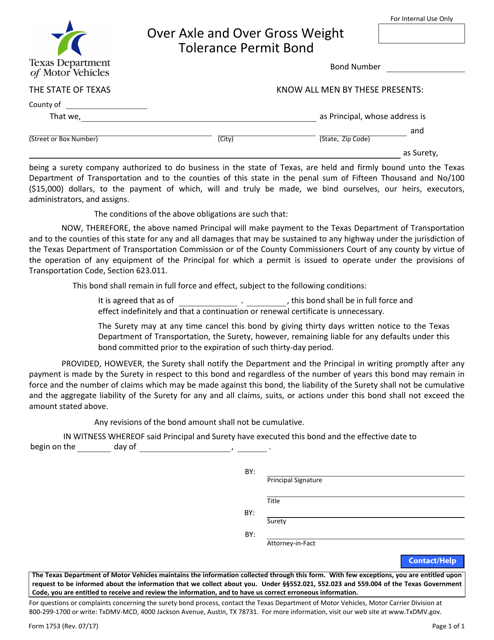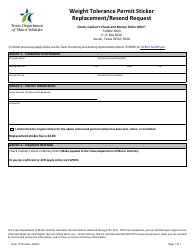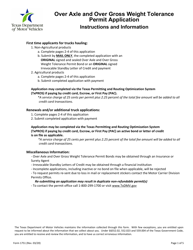This version of the form is not currently in use and is provided for reference only. Download this version of
Form 1753
for the current year.
Form 1753 Over Axle and Over Gross Weight Tolerance Permit Bond - Texas
What Is Form 1753?
This is a legal form that was released by the Texas Department of Motor Vehicles - a government authority operating within Texas. As of today, no separate filing guidelines for the form are provided by the issuing department.
FAQ
Q: What is a Form 1753 Over Axle and Over Gross Weight Tolerance Permit Bond?
A: The Form 1753 Over Axle and Over Gross Weight Tolerance Permit Bond is a bond required in the state of Texas for vehicles that exceed the legal axle or gross weight limits.
Q: Who needs a Form 1753 Over Axle and Over Gross Weight Tolerance Permit Bond?
A: Truck owners and operators in Texas who need to move vehicles that exceed legal weight limits.
Q: Why is a Form 1753 Over Axle and Over Gross Weight Tolerance Permit Bond required?
A: The bond ensures that the permit holder will comply with all laws and regulations regarding the transportation of overweight vehicles.
Q: How do I get a Form 1753 Over Axle and Over Gross Weight Tolerance Permit Bond?
A: You can obtain this bond from a licensed surety bond company.
Q: How much does a Form 1753 Over Axle and Over Gross Weight Tolerance Permit Bond cost?
A: The cost of the bond varies depending on factors such as the amount of coverage required and the applicant's creditworthiness.
Q: What happens if I don't have a Form 1753 Over Axle and Over Gross Weight Tolerance Permit Bond?
A: Without the bond, you will not be able to obtain the necessary permits to legally transport overweight vehicles in Texas.
Q: How long is a Form 1753 Over Axle and Over Gross Weight Tolerance Permit Bond valid?
A: The bond generally remains in effect for one year from the date of issuance.
Q: Can I cancel a Form 1753 Over Axle and Over Gross Weight Tolerance Permit Bond?
A: Yes, the bond can be canceled by the surety company, but a notice period is usually required.
Q: Is a Form 1753 Over Axle and Over Gross Weight Tolerance Permit Bond the same as insurance?
A: No, the bond is a form of financial guarantee that ensures compliance with regulations, while insurance provides coverage for specific risks.
Form Details:
- Released on July 1, 2017;
- The latest edition provided by the Texas Department of Motor Vehicles;
- Easy to use and ready to print;
- Quick to customize;
- Compatible with most PDF-viewing applications;
- Fill out the form in our online filing application.
Download a fillable version of Form 1753 by clicking the link below or browse more documents and templates provided by the Texas Department of Motor Vehicles.



